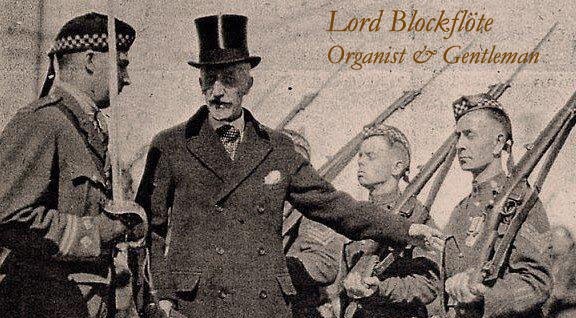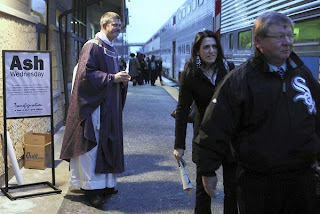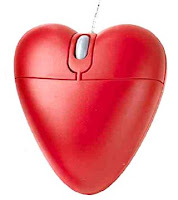'Richard Proulx died last Thursday night (February 18) at 11:25pm in Chicago. Please keep him, his sisters, family and friends in your thoughts and prayers.'
Here is a short biography of Richard Proulx:
RICHARD PROULX (1937-2010) was a widely published composer of more than 300 works, including congregational music in every form, sacred and secular choral works, song cycles, two operas, and instrumental and organ music. He served as consultant for The Hymnal 1982, the New Yale Hymnal, the Methodist Hymnal, Worship II and III, and has contributed to the Mennonite Hymnal and The Presbyterian Hymnal. Proulx was a member of the Standing Commission on Church Music of the Episcopal Church and was a founding member of the Conference of Roman Catholic Cathedral Musicians. He has conducted choral festivals and workshops across the country as well as in Canada, the Netherlands, Switzerland, Scotland, Australia, and New Zealand.
Richard Proulx was appointed composer-in-residence for 1994–1995 at the Cathedral of the Madeleine in Salt Lake City, and was a visiting fellow at the Seminary of the Southwest in Austin. He has served on summer faculties of the Montreat Conference, the Evergreen Conference, and St. John’s University School of Theology. Currently working as a free-lance composer and conductor, he has also been an editorial consultant.
In 1991, Richard Proulx founded the Cathedral Singers as an independent recording ensemble. The group has sung a number of live concerts in the Midwest and has produced over 20 recordings of a great variety of choral music.
In the field of commercial music, Proulx composed the 1971 theme song for Union Pacific Railroad, as well as an orchestral score for a documentary film, The Golden Door. Two arrangements sung by the Cathedral Singers were featured in an episode of ER on NBC, and the singers are heard in a New Earth video, Mount Shasta: Meeting of Heaven and Earth. Proulx’s organ setting of Veni Creator is heard in the 1997 movie, The Devil’s Own.
A native of St. Paul, Minn., Proulx began piano studies at age six and benefited from the unique musical training then fostered in that city’s parochial schools, where twice daily solfège and choral singing were emphasized. He attended MacPhail College and the University of Minnesota, with further studies undertaken at the American Boychoir School at Princeton, St. John’s Abbey–Collegeville, and the Royal School of Church Music in England.
Proulx’s organ studies were with Ruth Dindorf, Arthur Jennings, Rupert Sircom, Gerald Bales, and Peter Hallock. Training in choral conducting was provided by Bruce Larsen, Donald Brost, and Peter Hallock, along with extensive seminars with Donald Bryant, Robert Shaw, and Roger Wagner. He studied composition with Leopold Bruenner, Theodore Ganshaw, Bruce Larsen, and Gerald Bales.
From 1980 to 1994, Richard Proulx was organist–music director at the Cathedral of the Holy Name in Chicago. He strengthened the cathedral’s outreach to the city it serves by establishing an extensive and innovative music program. His broad-based liturgical music program quickly became a model for cathedrals across the country. The concert series, "Music for a Great Space," involved the cathedral choirs with many of the finest instrumentalists in the Chicago area. The choirs toured the Midwest in 1982 and 1991, and Europe in 1988. Proulx was also responsible for the planning and installation of two new mechanical-action organs for the cathedral: Casavant II/19 (Quebec, 1981) and Flentrop IV/71 (Holland, 1989).
Before coming to Chicago, Proulx served for ten years (1970–1980) at St. Thomas Church, Medina/Seattle, where he directed three choirs and a chamber orchestra, established a tradition of liturgical handbell ringing, and was organist at Temple de Hirsch Sinai. Previous positions included St. Charles Parish, Tacoma; St. Stephen’s Church, Seattle; and 15 years (1953–1968) at the Church of the Holy Childhood in St. Paul.
Richard Proulx has received a number of prestigious awards. He received a commission for a new opera from the National Endowment for the Arts in 1989 ; the same year he was presented the Gold Medal of the Archdiocese of Chicago by Joseph Cardinal Bernardin. In 1994, he received an honorary doctorate from General Theological Seminary in New York City and also the BENE award from Modern Liturgy Magazine as "the most significant liturgical composer of the last 20 years." He also was named the 1995 Pastoral Musician of the Year by the National Association of Pastoral Musicians. In 1998, Richard Proulx received the Pax Christi Award from St. John’s University in College, Minn.
A rare combination of talents as composer, conductor, music editor, and organist, together with wide experience across denominational lines, has given Richard Proulx a unique perspective of both the opportunities and the challenges found in liturgical music making in our time; he remains committed to the enriching and balancing role of the arts in people of all ages.
Richard Proulx, may the Choir of Angels lead you into paradise; may the martyrs greet you at your arrival and lead you into the holy city, Jerusalem. Rest in peace.
Tiny Victories
7 years ago







